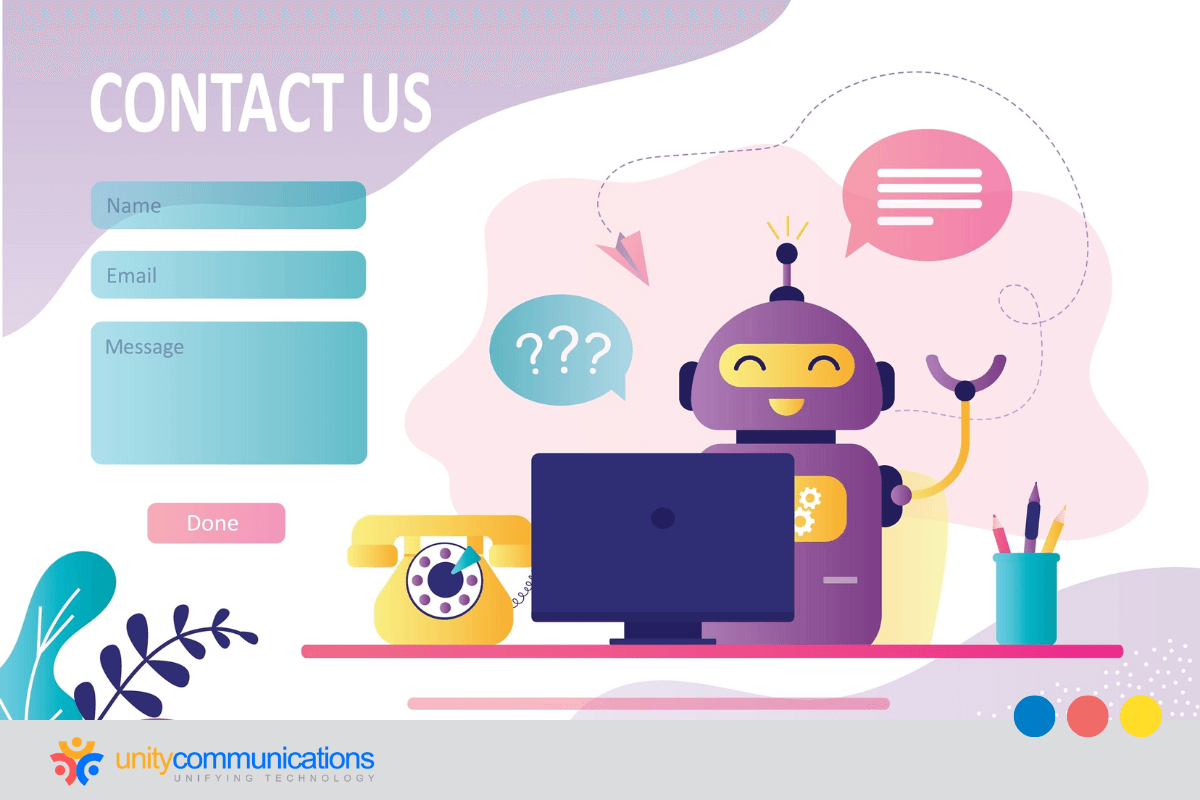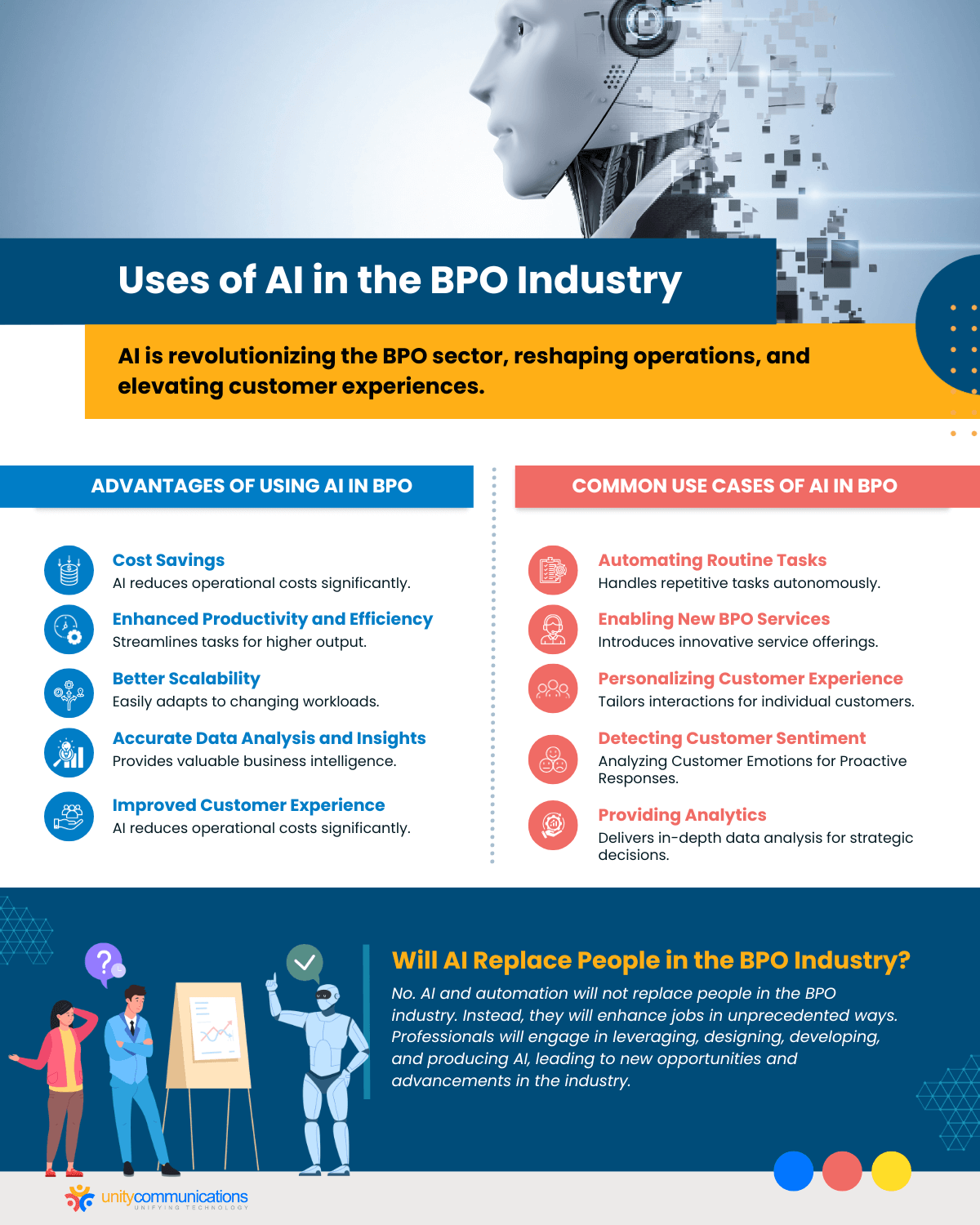IN THIS ARTICLE
Table of Contents
Artificial intelligence (AI) transforms various aspects of the business, automating mundane and repetitive tasks, improving efficiency and productivity, and allowing for smarter and more accurate decision-making.
One of the main applications of AI is business process outsourcing (BPO). By augmenting human decision-making and replacing admin activities with automation, AI improves customer experience, streamlines operations, and reduces costs.
AI has created endless possibilities for BPO services, but many wonder whether it can replace people.
Let us explore the use of AI in the BPO industry, its benefits to outsourcing clients, and the viability of it replacing human agents.
How BPO Companies and Clients Can Benefit from AI

So what is BPO? BPO is the process of subcontracting repetitive, menial activities to a third party that can more efficiently perform the work. The world of BPO has witnessed massive changes in the past decades. Rapid technological advancements have revolutionized the sector, including the deployment of AI systems.
The use of AI in the BPO industry has proven cost-effective, efficient, and reliable. AI is augmenting the way outsourcing providers operate, and it has brought many benefits to client companies. Here are a few:
- Considerable cost savings: With AI-powered automation, BPO firms reduce the need for human resources and determine areas for process improvement, leading to higher efficiency and cost savings. As a consequence, providers can offer client companies access to affordable services. After all, 57% of companies outsource to save costs.
- Enhanced productivity and efficiency: AI increases speed and reduces human errors in BPO processes. It can automate repetitive tasks such as data processing and encoding. It can also make more intelligent calls to replace traditional voice calls from customer service representatives.
- Better scalability: AI can scale to meet the client’s changing demands. It quickly adjusts based on the level of automation that client companies require, allowing for flexible operations without needing to hire more staff.
- Accurate data analysis and insights: AI helps BPO firms manage and analyze large amounts of data, identifying trends and generating insights that client companies can use to improve operations and make smarter decisions. Brands can use these reports to better understand customers and their behaviors and identify areas for improvement.
- Better customer experience: AI in call centers and customer service helps handle basic inquiries that do not require human intervention and provide real-time resolutions. It offers a more immediate response. AI is also programmable with personality models to deliver more personalized customer interactions.
Uses of AI in the BPO Industry
Almost 70% to 80% of all rule-based business processes can be automated. Most operations outsourced to BPO companies are rule-based, repetitive back-end functions ideal for AI-powered and robotic process automation (RPA). Here are the common use cases of AI in the BPO industry:
- Automating routine tasks: The most common use of AI in BPO is automation. Many functions require managing large amounts of data, which is time-consuming and tedious. RPA tools automate such tasks, minimizing errors and freeing workers up for strategic tasks requiring creativity and human judgment.
- Enabling new types of BPO services: AI enables previously impossible processes. For instance, machine learning (ML) and natural language processing (NLP) analyze customer interactions. They then spot trends and patterns that live agents cannot. This analysis helps brands learn customer preferences and tailor services accordingly.
- Personalizing customer experience: AI helps personalize the buyer’s experience. For instance, virtual assistants help customers navigate complex problems. Other tools record a customer’s behavior and history and make predictions about potential issues or inquiries they may have. Call centers can then proactively address the issue.
- Detecting customer sentiment: Emotional intelligence AI detects customer sentiment during calls. It analyzes the tone of voice, length of pauses, and even the number of times an agent interrupts a customer. Once detected, it will inform agents how the customer feels and provide suggestions.
- Providing analytics: A common function of AI in BPO call centers is to provide in-depth analytics on first-contact resolutions, call times, and more. It spots trends and assesses whether customers have had a positive experience. Since AI detects sentiment, it offers more versatile analytics than human call center agents.
Will AI Replace People in the BPO Industry?

No. A close examination of the use of AI and the role of machine learning in BPO suggests that it will not replace people. Instead, AI and automation will enhance jobs in ways previously unimaginable, and more professionals will engage in leveraging, designing, developing, and producing AI.
AI improves efficiency by automating many routine jobs and reducing the need for human workers. But this does not mean that AI deployment will result in massive unemployment in the BPO industry. Rather, developing new types of work requiring different expertise and skills will counteract the displacement of human employees.
For instance, as the use of AI in the BPO industry becomes more popular, companies will need people skilled in programming, data analytics, and similar areas. Moreover, businesses will see a growing demand for skills such as user interface design, customer experience design, and other specialties that require empathy and human creativity.
The advancement of AI-enabled services means a big shift in the expertise and skills required for BPO work. Employees must develop new skills to maintain competitiveness in the industry. Thus, outsourcing firms must invest in training and upskilling initiatives to empower agents in an AI-driven landscape.
The Bottom Line

AI technology automates mundane and repetitive tasks, allowing staff to concentrate on complex, value-adding activities. It also identifies patterns in data, makes better predictions, and generates insights to improve decision-making and operations.
AI-powered tools, such as virtual assistants and chatbots, offer immediate resolution to end customers, improving overall satisfaction. Using AI in the BPO industry results in positive customer experiences, enhanced efficiency, more intelligent decision-making, and significant cost savings for outsourcing providers and clients.
AI is, at best, an extension of BPO, but it is unlikely to replace people. AI will support and enhance BPO when implemented with the right approach.
Let’s connect to find out how Unity Communications uses a mix of AI and people for outstanding results.





